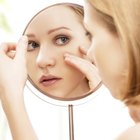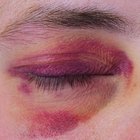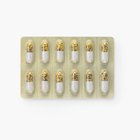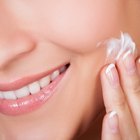
Fuse/Fuse/Getty Images
Your skin is one of the most complex organs in your body as it is responsible for not only protecting internal organs, but also connecting you with the outside world. Weighing an average of 8 lbs and measuring 22 square feet, skin is outfitted with a complex system of nerves and glands. Over time, aging and environmental toxins take their toll on skin health, resulting in a loss of elasticity, wrinkles and other problems. While the market is overflowing with skin care products, the use of L-arginine, a semi-essential amino acid, may help restore skin health and assist in wound healing.
Role of L-Arginine
L-arginine is naturally produced in your body, and it may also be consumed through dietary sources containing protein as well as through supplementation. One of the responsibilities of arginine is to support the production of nitric oxide, which widens blood vessels to enhance blood flow. This amino acid also activates the production of protein, and because of this action it is believed to help expedite wound healing, prevent tissue deterioration and increase sperm production. Do not use L-arginine internally or topically without the approval of your doctor, as this compound has caused death in groups with heart ailments.
Wound Healing
One of the proposed uses of L-arginine for the skin is to increase wound healing time. Your skin heals wounds in three steps: inflammation, tissue formation and tissue remodeling. Protein plays a fundamental role in all three healing processes, and because arginine supports the production of protein, proponents claim arginine may speed up healing time. Although preliminary studies on rodents and humans found arginine enhanced wound strength and collagen deposits, the effectiveness of this amino acid on wound healing is undetermined among scientists and further research is required.
Collagen Enhancement
A study outlined in the July 2005 issue of “The Journal of Trauma” found arginine supplementation increased collagen synthesis in mice. Collagen is an essential compound for connective tissues and is primarily used to protect from trauma, but as you age, collagen production begins to slow. While no scientific evidence exists to fully support the proposed use of L-arginine and collagen enhancement, preliminary evidence is promising.
Safety Considerations
Talk with your doctor before starting a supplementation routine with L-arginine. Potential side effects of this supplement include low blood pressure, allergies, and if you have herpes, arginine may worsen an outbreak. Do not take arginine supplements with high blood pressure medications or nitrates.
Related Articles

Skin Care Products That Contain ...

Glucosamine: Skin Benefits

Collagen & Rosacea

Does Milk Thistle Help Skin?

What Are the Benefits of Extrapone ...

List of Retinoids

Pycnogenol and Acne

What Vitamins Help the Liver?

Bromelain & Bruising

Can You Decrease Sebum With Vitamin A?

Traditional Uses of Cuscuta

How to Reduce Acne Inflammation

Foods Containing Copper Peptides

Active Ingredients in Face Creams

What Is Aloe Good For?

Benefits of Shea Butter and Coconut Oil ...

Ingredients in Hairfinity Vitamins

The Difference Between Retin A & Renova

What Are the Dangers of Fraxel Repair?

Ingredients in Restylane
References
Resources
Writer Bio
Jonathan McLelland has been a professional writer since 2005. He has worked as a story writer and editor for the international sitcom, “Completing Kaden,” as well as a proposal writer for various production companies. McLelland studied communication and theater at St. Louis Community College.
Photo Credits
Fuse/Fuse/Getty Images